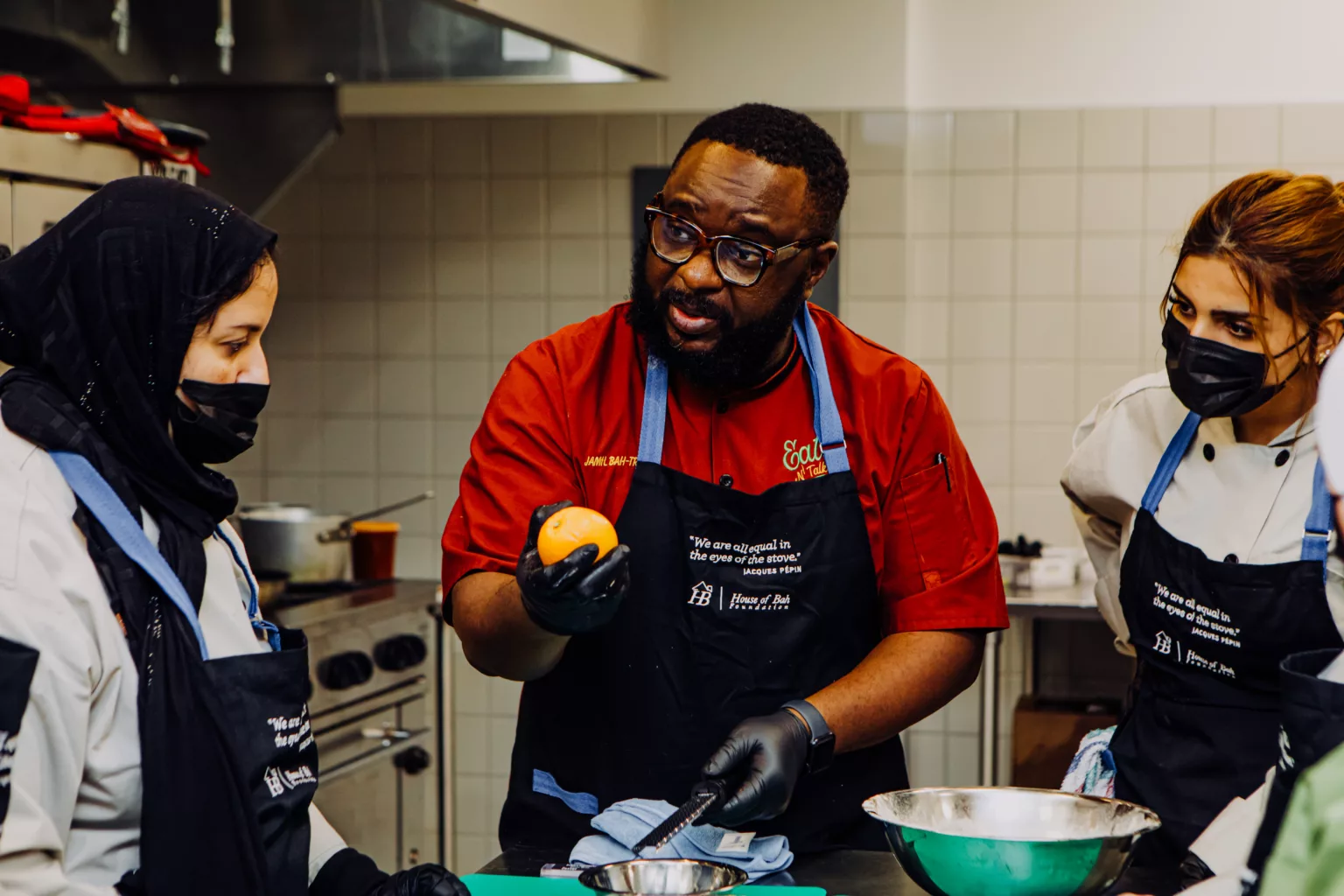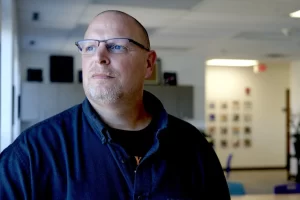By Sarah Baker Hansen
Flatwater Free Press
Mouthwatering scents fill the basement kitchen where Djamil Djibril Bah-Traore is teaching his latest class of students how to make their way in America.
He shows them how to chop vegetables, measure spices and prepare dishes for an upcoming event catered by House of Bah, the company and nonprofit foundation that Bah-Traore started.
“How much salt?” one student asks.
“Cook from your heart,” Bah-Traore answers. “We don’t cook from a recipe. We cook from the heart. You know when it’s enough.”
His answer is murmured back in Arabic, French and the West African language Ewe to the students – refugees from Syria, Jordan, Morocco, Benin and Sudan.
The House of Bah is still a catering company. Djamil Bah-Traore (pronounced Ja-meel) regularly cooks African cuisine at weddings, pop-ups and special events in Omaha, sometimes renting a food truck and serving from there.
But since 2022, Bah-Traore has, through the House of Bah Foundation’s classes, helped more than 30 immigrants prepare for a job in the food industry or to, if they choose, start their own food businesses.
Some have come to work with Bah-Traore, teaching others what they learned, helping translate and running the kitchen during catering jobs. At least one graduate, a refugee from Ukraine, is now working in the restaurant industry.
“They don’t really have any options as far as learning how a commercial kitchen works, or what the life of a professional chef is like,” Bah-Traore said. “This class gives them the chance.”
He’s also working toward a more personal goal: Widely introducing Omahans to African cuisine.
Bah-Traore moved to the United States in 2003 to study accounting and business, and worked in corporate finance for 13 years. But he couldn’t quiet memories of his childhood in the West African country of Togo – his family, his mother’s cooking, the food he ate as a kid.
He saw a TV commercial for the Metropolitan Community College culinary institute and decided to enroll.
He quit his corporate job and became a student, driving a taxi at night to support his family: wife Aicha, daughters Nihad, Naazik and Nuzhat, and sons Murad and Muksit. He also supports cousins and two half brothers, aged 17 and 22, in Togo.
Bah-Traore interned at Dante in west Omaha while he was a student. He’d drive his taxi to the restaurant, do his shift, get back in the taxi and drive, sometimes all night long.
He kept that schedule – MCC during the day, cook for a few hours, drive all night, get a bit of sleep, start again – for a year and a half, until he graduated from the culinary institute.
In a new way, he was continuing a long family tradition.
Bah-Traore’s great-grandfather worked as a cook, among other jobs, in Togo before and after the French seized power at the end of World War I. He taught all of his sons how to cook. Bah-Traore’s mother learned to cook from her father, and then taught him.
After he graduated, Bah-Traore worked in several hotels, all the while doing his own version of African food at pop-up events, most often at the former House of Loom. He regularly suggested to his kitchen bosses that he’d like to introduce African dishes on menus or for hotel catering jobs. They always turned him down.
“It seemed like there was no way to bring African food into the hospitality business,” he said.
When the coronavirus hit, and Bah-Traore was no longer in the kitchen daily, he had time to think. He decided he would bring African cuisine into the hospitality business himself.
He’s done a pop-up at the Switch, the food hall in Aksarben, and continues to cater events, including weddings for African families. The next step is getting House of Bah on preferred catering lists for event venues.
Aboubakar Tchalombo, a House of Bah board member and Bah-Traore’s half brother, said there’s value in normalizing African cooking. “Someone being able to have this kind of food at their wedding, it makes them feel at home,” he said.
House of Bah is now also cooking at events where most of the patrons have never tried African food. Those are perhaps the most fulfilling experiences, Bah-Traore said.
Guests tell him his chicken and waffles are the best they’ve ever had. The smoked brisket rice? Amazing. The diner who had only tried black eyed peas once and hated them had his mind changed with Bah-Traore’s version.
Then there was the 80-year-old German woman who tried Bah-Traore’s food at an event. She told her daughter she loved it.
“The guest said ‘if you can make my mother love African food,” Bah-Traore said, “you can make anyone love it’.”
Bah-Traore said lots of guests ask him when he’s planning to open a restaurant. But he has different plans in the works: a class, which he thinks will take place in 2024, where he will work with MCC to educate working chefs about how to cook African dishes as part of a new course called the African culinary academy. And in 2025, a Midwest African Food Expo that will feature food from the African diaspora, immigrants and refugees cooking across the Midwest.
Brian O’Malley, an associate dean at the culinary institute, said Bah-Traore sees food as a tool to connect people to their community.
“He helps these folks see that it might also be a way into a career,” he said. “That has been really impressive to see. At the same time, it also celebrates foods we don’t have on our radar.”
As the final cooking class of 2023 winds down in the basement kitchen, the students begin to prepare a family meal for lunch: a fragrant, traditional African mafé sauce blended with an Indian coconut curry that will be served with basmati rice. Generally made with chicken, Bah-Traore this day prepared a vegan version with tofu, plantain and cauliflower.
Roukaya Alramadan, a graduate who helps translate during the classes, relayed why some of the current students – all women – enrolled for the course.
“To learn new things, and new techniques,” Alramadan translates. “To open a business in the future. To learn the techniques in the American way. To get better at cooking.”
The students all wear aprons gifted to the House of Bah from famed chef Jacques Pépin’s foundation – which also gave the nonprofit a $10,000 grant – branded with the same line: “We are all equal in the eyes of the stove.”
The phrase rings true as the women move seamlessly through the kitchen, washing dishes, adding seasonings and tomato paste to the sauce, slicing and zesting oranges, all the while chatting in different languages. As the dish is finished, everyone gets a tasting spoon to sample before Alramadan begins dishing out sizable plates and the cohort sits down to eat lunch.
Tchalombo, between bites, said the classes continually surprise him because they bring people from different cultures who speak different languages together through one thing: food.
Bah-Traore nodded.
“One day, when you go to an Omaha public school and every kid knows what jollof rice is, that is how we become a diverse country,” he said. “If you love somebody’s food, it is hard to hate them.”The Flatwater Free Press is Nebraska’s first independent, nonprofit newsroom focused on investigations and feature stories that matter.











